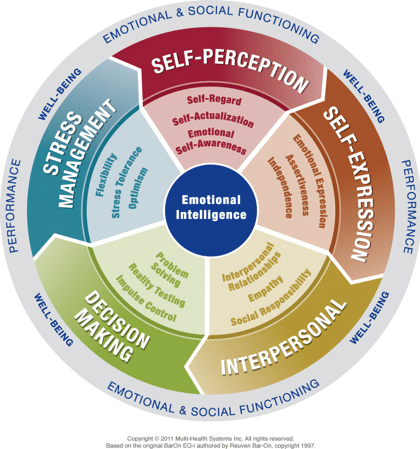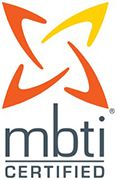
If you’re a Strategic Account Manager (SAM) or a Key Account Manager (KAM) your role requires an elaborate variety of skills. From technical expertise, analytical and strategic thinking to communication, management, leadership and negotiation skills. It is a highly complex job.
Strategic Account Manager – A Complex Job
Successful SAMs or KAMs understand how to integrate this complexity and this mix of hard and soft skills. The Strategic Account Management Association (SAMA) is the sector’s professional association and is focused on helping to establish strategic, key and global account management as a separate profession, career path and proven corporate strategy for growth. The SAMA has developed a competency model for the profession that articulates how technical and cognitive skills combine with social and emotional competencies to create high performance.
Emotional Intelligence – An Effective Framework To Develop Soft Skills
Emotional Intelligence (EI) provides SAMs an effective framework to develop soft skills and guides them on how to best integrate these in their skills set to leverage their overall performance.
So what is EI? EI is a set of social and emotional skills that influence the way we perceive and express ourselves, develop and maintain social relationships, cope with challenges, and use emotional information in an effective and meaningful way.
This definition is based on the EI model developed by Dr. Reuven Bar-On in the 1990s and is operationalized by the Emotional Quotient Inventory (EQ-i 2.0) assessment. This scientific and proven framework provides us insight and a unique access into our emotional and social functioning. The EQ-i 2.0. assessment takes 15 minutes to complete and provides a unique individual profile which then becomes an easy to use tool for professional development.
Most SAMs have spent a lot of time learning and developing their hard skills but much less time on their soft skills. This can result in an unbalanced skill set detrimental to their performance even if they have great technical skills. EI provides a tool that they can use to restore an effective balance and optimize their performance.
Emotional Intelligence – Accelerating SAMs Professional Development
Let’s take a look at the social and emotional skills required from effective and successful SAMs:
SAMs need to be customer focused and tuned into their customers in order to add and create value and provide excellent service. To achieve these objectives, they need to have strong communication and influence skills, know how to listen beyond what is said, effectively articulate a value proposition, persuasively promote their ideas, get buy in among key decision-makers and when needed be comfortable addressing difficult situations or conflicts. To co-create value they need to be able to challenge the status quo and collaborate with customers. They need to have strong negotiation skills and ensure win-win outcomes.[i]
In the process of their work SAMs engage with many teams, both internally and with the customers’ organizations. To be successful they need to be skilled at managing multifunctional teams without any supervisory authority. They need to demonstrate strong interpersonal skills to develop and maintain trustworthy relationships and manage a complex web of key stakeholders. They must to have leadership skills to develop a team vision and then lead their teams in the implementation and execution, while providing support to team members and ensuring alignment of stakeholders. [ii]
In addition, SAMs operate globally and must demonstrate sensitivity, understanding and empathy for cultural differences in order to adapt and be effective in a global environment.[iii]
15 Key Competencies
The framework of EI provides an effective way to support and develop these competencies. The EQ-i 2.0 model of emotional intelligence is comprised of fifteen competencies across five categories which form the building blocks of abilities such as communication, decision-making, time management and resilience.

Interpersonal
The Interpersonal group focuses on the critical competencies SAMs need to build and develop strong relationships, manage cross-functional teams, align stakeholders, influence and negotiate. Although the model’s competencies are separated in five distinct groups they are all interrelated and mutually impact each other. For this reason, interpersonal competencies build on, among others, strong and established Self-Perception and Self-Expression competencies.
Self-Perception And Self-Expression
The Self-Perception group is a building block group, because it is about our internal world and involves competencies that determine how we perceive ourselves, our mindset and our attitudes. Being self-confident helps SAMs overcome obstacles and being motivated ensures they are driven by a desire to perform and always do better, for example. The Self-Expression group is the flip side, focused on the outside world, as it describes how we choose to express ourselves and how we communicate. In order to build trustful relationships SAMs need to share and express their feelings to establish rapport, create transparency and inspire trust. Emotional expression of course happens in a context and is a matter of degree, which SAMs assess by being tuned into others and having empathy. An effective SAM will read and understand these social cues and adjust his behavior accordingly and in the moment. He will be more open with a long-time customer than with a new one that he doesn’t know that well yet, for example.
Decision-Making
The Decision-Making group is highly relevant for SAMs, as they constantly face many and often complex decisions. To optimize their decision-making SAMs must integrate emotional information in an effective and meaningful way, along with analytical and strategic elements, data and facts. Understanding and managing emotional aspects to get buy-in or during negotiations for example can be the difference between success and failure.
Stress-Management
The Stress-Management group is particularly important in the SAM environment, which is fast paced, competitive and high stress. Stress, especially if chronic, can be detrimental to performance, both at a cognitive and emotional levels. Too much stress is often behind leadership failure and when a leader’s stress level gets high enough he or she loses the ability to make wise decisions. Being aware of stress, assessing its impact and developing appropriate coping strategies reflects good stress management practices and is key to effective functioning. Developing flexibility, resilience and remaining optimistic in the face of adversity will allow SAMs to process stress more effectively and mitigate its damaging effects.
Individualized Road Map
Each individual has a unique profile, with distinctive strengths and areas of development. The EQ-i assessment provides an individualized road map that becomes a daily guide and allows SAMs to accelerate their professional development.
Developing EI skills is an experiential process. Just learning about EI is not sufficient to make a difference. Applying it to your behavior is what brings change. Taking small steps but on a regular basis, daily for example, is what rewires your brain and eventually creates a momentum that allows transformation and leads to enhanced performance.
To Learn More
If you are interested to learn more about how EI can help you leverage your career Bo Golovan will be facilitating a workshop on EI for SAMs at SAMA Academy on July 25th, 2018 in Chicago. This event is open to SAMA members and non-members.
[i] SAMA’s Competencies Model – Detailed, 2012 Strategic Account Management Association
[ii] Ibid.
[iii] Ibid.






























